- Home
- T. Kingfisher
The Raven and the Reindeer Page 2
The Raven and the Reindeer Read online
Page 2
Oh well. He kissed me once. He knows I’m here, and nearly grown up. And he doesn’t have an understanding with any other girl, because he would have told me.
Her lips twisted, looking out at the snow. She could be sure of this. It would not have occurred to Kay that telling her about another girl would make her jealous.
That’s ‘cos we’re best friends. And best friends tell each other everything.
She slid a glance at Kay. His dark eyelashes framed his pale blue eyes, as he drank in the blowing snow. Whatever he was thinking, he kept it to himself.
That night Gerta slept in her trundlebed near the stove. She curled up under the green-patched quilt and there she dreamed.
She dreamed that the snow had stopped and the moonlight glowed through the window. Some sound had roused her attention—a high thin chiming, like bridle bells.
I could get up.
It’s so warm here. It’ll be cold by the window.
She looked up into the shadows of the ceiling. The rafters were hung with baskets. Her grandmother baked flat, hard loaves of bread and strung them on wooden poles to keep them. They were delicious when crumbled up and soaked in the juices of rabbit or chicken or deer.
The sound came again. Tingatingatinga-ting-ting-ting.
She pushed off her quilt and walked to the window.
Everything was white and blue and silver. The walls of the building across the alley were dark smears, crowned with thick white cliffs of snow.
Tingatingatingatinga…
Down the rooftop came a white sleigh, cut from shining birch wood. Bells rang merrily along the traces.
There is a sleigh on the roof, Gerda thought, and then, Ah. I am dreaming.
Because she was dreaming, she did not question that the sleigh was pulled by snow-white otters. They slipped and slithered down the slant of the roof, sliding over each other, a river of white fur and black eyes and arched white whiskers. Gerda kept expecting the traces to get tangled, but somehow the sled kept moving forward.
At the edge of the roof, the sleigh stopped. The otters pulled up, chuckling and chirping to each other in liquid voices. They were larger than any otters that Gerda had ever seen. They had pale blue bridles with silver bells and their webbed feet moved across the snow like snowshoes.
Gerta was so fascinated by the otters that she hadn’t looked at the sled at all. She tore her eyes away from them with reluctance.
It was a relatively small sleigh, only large enough for one or two people. Of course, thought Gerta, otters probably can’t pull very much weight, not like horses or reindeer…
The runners were ivory, carved in the shape of leaping seals. The trim was ice blue and matched the bridles.
Seated in the sleigh was a woman.
Gerta, who had been highly delighted by the sleigh and the otters, felt the first chill.
The woman was very tall and very slim. Her face was as angular as a fox and her hair was white, yet somehow she did not look old. She sat in the sled with her hands on the reins and looked around, and the world seemed to change as she gazed down at it.
The buildings and the streets became small and shabby. The town looked old and grimy. Gerta, who loved her town, caught her breath at the injustice of it, because nothing about the town had changed, it was only that the woman in the sleigh was so far above it all.
Only the snow remained clean and white, still glowing in the moonlight. The woman in the sleigh did not look at the moon, and some small, wise part of Gerta thought, I bet she can’t. It doesn’t change if you look at it. No matter how pale and pure and perfect you are, the moon is even more perfect.
Gerta, who was short and sturdy and turned pink when she hurried, felt her hands clench into fists.
I wish I would wake up. The otters were wonderful but I don’t want to see the rest of this.
The Snow Queen—surely it must be the Snow Queen, surely it could be no one else—stepped out of the sleigh. She wore white deerskin boots, exquisitely small, and left no track upon the snow.
Gerta jerked back, suddenly afraid that the Snow Queen would see her.
She can’t touch me. If she touches me, something bad will happen.
For a moment, she thought that she was safe. The woman would leave. The dream would end and in the morning perhaps all she would remember would be the otters.
Then a pale oval appeared at the other window, directly across from Gerta.
It was Kay.
No! Gerta wanted to yell. No, go back inside, don’t let her see you!
But this was a dream and dreams are the sisters of nightmares. She could not yell and her hands curled into useless fists on the window frame.
The Snow Queen walked to the edge of the roof and smiled down at Kay.
Kay’s mouth fell open.
For a long moment, they looked at each other. Their eyes, Gerta saw, were the same color.
The Snow Queen crooked her finger, curled it back.
No! Kay, no, run away! If she touches you—!
She did not quite know what would happen, only that it would be terrible.
Kay pushed the window open and began to climb out.
The iron railings between the two windows, the highway on which Kay and Gerta moved back and forth, was slick with ice. Gerta covered her mouth with her hands, afraid that he might fall—
—it’s better if he falls, the snow is thick, he’ll probably live, if she touches him he’ll die or worse—
The Snow Queen reached down and took his hand.
Kay gasped. Even through the glass, Gerta could hear it. He gasped and for a single heartbeat, his eyes glowed like ice in the moonlight.
The Snow Queen’s bones were fine and delicate, but her strength was enormous. She pulled him onto the rooftop and helped him into her sled.
Gerta couldn’t help it. She slapped a hand against the cold glass. “Kay!” she cried. Her voice seemed to come from very far away.
He did not look around. He settled himself in the sled, under a blanket trimmed with white fox-fur.
The Snow Queen turned and looked down at Gerta.
Gerta jerked back as if she’d been lashed with a whip.
The Snow Queen’s gaze was no kinder to her than it was to the town around them. Gerta felt young and weak and disgustingly mortal. She was a stinking, bleating creature, a heifer-calf with muck tangled in her tail. She did not deserve to share the same air with the magnificent Snow Queen.
Her back wanted to bow and her legs wanted to buckle. She wanted to grovel and apologize for existing. She wanted to hide her eyes and crawl away.
I can’t—I can’t—she’s got Kay—I’ve got to stop her, but she’s so much better than me—
And then, as if from a very great distance, she thought, Grandmother wouldn’t crawl.
Gerta sank down to her knees under the window…but she did not look away from the Snow Queen’s eyes.
The Queen reared back a little, like a great swan arching her neck. She turned back toward Kay.
Gerta gasped as if a stranglehold had suddenly been broken.
The Queen stepped into the sleigh, bent down, and kissed Kay on the cheek.
She slapped the reins and the otters rose up, cheerful and chiming. The sleigh began to move down the edge of the rooftop.
“No,” whispered Gerta. Her throat was hoarse, as if she had been screaming. A whisper was all she could manage. “No!”
The Snow Queen looked over at her.
She smiled.
It was a nasty, cold smile, but at the same time, it was more human than any expression Gerta had seen on the Snow Queen’s face. It was a smile that said I have something you want, and it’s mine now, and you’ll never get it back.
Kay gazed forward and never looked behind him.
The otters leapt from the roof and the sleigh followed. It would have been an enormous drop, but it did not occur to Gerta to worry. They would ride a snow flurry down, or a sheet of icicles. The Snow Queen would not b
e stopped by anything so foolish as a three-story building.
They were gone.
The only tracks on the rooftop were the holes left by Kay’s feet, and they filled up with snow so fast that they might as well not have been there at all.
Gerta stayed at the window until her teeth chattered, but there was no point. She knew there was no point.
She crept to the trundle bed and pulled the quilt over her head.
It was a dream, thought Gerta forlornly. It was all a dream. I’ll wake up and I won’t remember it very well at all and we’ll laugh about it. I hope I remember the otters, but I’d like to forget her.
In the morning, Kay was gone.
CHAPTER FOUR
There is a great deal that goes on when someone goes missing, and none of it is good. It is a tiresome sort of panic, because there is no end to it. It goes on and on and on until you are hollowed out and empty and still there is no end.
First the families told each other that Kay was fine, that he had just stepped out to go sledding. It was a bit odd that he had left a puzzle half-done like that, but boys were odd sometimes.
Then they told each other that he had gotten lost but would turn up shortly. They would laugh about how foolish they were being.
Then they told each other that he was clearly lost in the snow but he was a smart lad and would dig down where he was and be safe.
Eventually the snow melted and the sun shone down and thaw came and went and they stopped telling each other anything at all.
Through all those long weeks, Gerta felt as if she was standing a little apart from everyone else. It was as if her dream had raised a wall of ice and the world was on the far side of it.
If it was a dream.
It can’t have been a dream.
It must have been a dream.
I know what I saw.
He wouldn’t have gone out in a blizzard. He isn’t a fool.
She lived the last moments of the dream a thousand times, seeing Kay look up, his lips parted, looking at the strange cold woman with an expression of lust and worship. The expression made her stomach clench like a fist.
I want it to be a dream because I don’t want him to look at anyone else like that.
I want it to be true because I don’t want him to be dead!
When she put it like that, there was no choice at all.
The woman had been so beautiful. Gerta’s heart ached for how beautiful she had been. She wanted to be able to turn to someone and say, “Did you see that?”
But no one else had seen her. Perhaps there had been no one else awake to see.
And the wall of ice stood between Gerta and the rest of the world, and she could not reach through it to say, “He isn’t dead. I saw him leaving in a dream.”
Gerta’s grandmother made hot tea in endless amounts, melting snow into water and throwing handfuls of herbs into it. The tea was the only thing that Kay’s grandmother would drink.
“My sweet little boy,” whispered Kay’s grandmother, her voice gone hoarse with weeping. “My sweet boy. Where did he go?”
“You’ll do no good following him into the next world,” said Gerta’s grandmother bluntly. “Eat some soup.”
Gerta silently appeared with soup in a mug and the old woman drank it. She had become old, it seemed, in the time since the spring thaw.
When she slept at last, her hair was a silver fan over the pillow. Gerta’s grandmother stroked it, her face lined and weary. In the distance, they could hear water dripping from the eaves, drip drip drip as the ice melted away.
Perhaps it was the thaw that made the first crack in the wall of ice around Gerta. Perhaps it was the steam from the soup or the tears on the old woman’s pillow.
“Grandmother?”
“Eh? Yes, child?”
“Is the Snow Queen real?” asked Gerta.
Her grandmother looked at her for a moment as if she could not understand the question. After a moment, she said “I suppose she’s real enough. Stranger things have walked the earth and left stories behind them.”
“I saw her,” said Gerta. “The night Kay…that night. I saw a sleigh on the roof. There was a woman in it, all over white. I thought I was dreaming, but Kay’s gone. He’s not coming back. I think she has him.”
Her grandmother made the sign to avert evil.
“Tell me about this woman.”
Gerta tried, at great length. Her tongue stumbled on some of the descriptions—on how beautiful the woman was, and on the look on Kay’s face. But parts of it she remembered clearly, like how the sleigh had looked and the way the runners had been a hundred carved ivory seals, slithering and sliding over top of one another.
Her grandmother drew in a sharp breath at that, for she had heard such things before, and she was certain that she had never mentioned them aloud.
After a long time, she said, “You’ve never lied, Gerta, even when you were little and trying to get out of trouble. Even when you were trying to cover up for Kay, you’d just stand there, stubborn as a little stone, and not say anything. If you say you saw the Snow Queen, I’ll not disbelieve you now.”
“As far north as north,” said Gerta. She took a deep breath and let it out. She was aware that what she was doing was quite unspeakably mad. “I have to go after him.”
Her grandmother closed her eyes. After a moment, she said, “I should tell you not to go. I should tell you one child lost is enough.”
“But you won’t,” said Gerta.
“But I won’t.” She looked back at her oldest and dearest friend, asleep on the couch with the lines of age and grief like fissures in her skin. “I’m an old fool. I told you and Kay about the Snow Queen. I should have known he’d take it to heart. There always was a spot of ice in him.”
“You couldn’t know—” said Gerta.
“I should have known. Things come when they’re called.” She scrubbed her hands over her own face. “If I lose you, it’s no more than I deserve.”
“I’ll be careful,” said Gerta. “You won’t lose me. I’ll just go north a little way and ask if anyone’s seen him.”
“Yes.” Her grandmother began hurrying around the room. “Take some food. I don’t want you starving.”
Gerta slung her pack over her back. “I will. Is there anything else I can do, Grandmother? Against the Snow Queen?”
The old woman shook her head. “In all the old stories, the only thing that ever won was love. And occasionally a good sharp knife.”
“I’ll take the kitchen knife with me, then,” said Gerta.
“Mind that you do. And wear your boots.” She kissed her granddaughter on the forehead. “An old woman’s grace go with you, child.”
Gerta went.
CHAPTER FIVE
Spring had advanced far enough that it only sometimes froze at night, but it could not be said that it was warm. The roads were muddy. Gerta’s boots squelched as she walked.
For the first few hours, her heart was light. She was going somewhere. She was doing something. She would get Kay back.
But as the evening started to fall, so did her spirits. Her calves ached from sliding back and forth in the mud. Her toes were very cold.
I can’t have come very far, not really. But I’ve been walking for hours. And where am I going to sleep?
In stories, the heroines were resourceful and cheerful and determined. Gerta had hoped to be all these things, but the sun was sinking behind the trees and she was feeling less and less resourceful. Cheerful was right out.
Shouldn’t there be a farmhouse somewhere? I could trade chores for a place to sleep…but that only works if there’s a farmhouse somewhere…
She was, in fact, in the woods. They were not dark or scary or twisted woods, but they were deep and full of sounds. Insects went skreek skreek and frogs went hnaaaaagh and an owl went Eeeeaaaagahahahah! and Gerta nearly jumped out of her skin.
She squelched down the road in a hurry, her heart pounding. Even knowing that it was an
owl didn’t help.
I should stop. I can hardly see. I could wander off a cliff.
Oh yes. Because there are lots and lots of cliffs in the middle of well-travelled wagon roads…
She kept walking.
A fallen log by the side of the road offered a refuge. She sat down on it and sighed.
I suppose I could just sit here all night…
She knew that it wasn’t cold enough to actually freeze to death. But the log was cold and damp and her backside got cold and damp and Gerta felt thoroughly miserable.
If I’m going to feel awful anyway, I might as well keep walking. At least I’ll get closer to Kay.
She got up. The ground sucked at her boots as she slogged back onto the road.
An hour or so passed. Probably. She couldn’t see the moon through the trees. The thought that it might only have been a few minutes was so discouraging that she tried not to think about it.
She was cold and she was tired. She had been sweating from exertion, so now her skin felt soggy. There was definitely a blister coming up on her heel.
It’s for Kay, she told herself. It’s all worth it for Kay.
Kay seemed very far away.
I will tell him all about this. He’ll be very impressed. He’ll say, “Oh, Gerta, how you’ve suffered for me…”
She engaged in this fantasy for a few moments, and then sighed. She was fundamentally honest, even with herself. Kay would look at her and say “You walked through the woods and it was cold? That’s your great suffering?”
“It was scary,” she would say. “And I had a blister.”
Gerta could actually hear in her head how “I had a blister” would hang in the air between them. She flushed a little, at the sheer stupidity of the thing she hadn’t actually said yet.
She kept walking. She tried to swing her right foot so that the heel wouldn’t rub. It was only partially successful.
The road began to go uphill. Gerta wanted to cry and hated herself for it, because all she was doing was walking down a muddy road in the dark. You didn’t get to cry about just walking down a road.

 Paladin's Strength
Paladin's Strength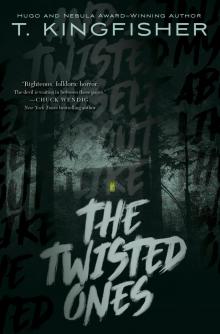 The Twisted Ones
The Twisted Ones The Hollow Places
The Hollow Places Paladin’s Hope: Book Three of the Saint of Steel
Paladin’s Hope: Book Three of the Saint of Steel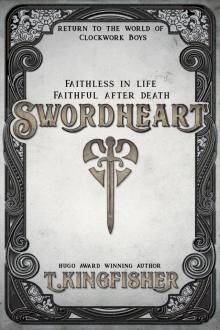 Swordheart
Swordheart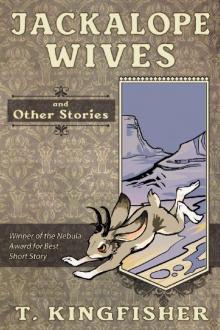 Jackalope Wives And Other Stories
Jackalope Wives And Other Stories A Wizard's Guide to Defensive Baking
A Wizard's Guide to Defensive Baking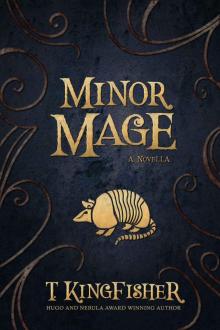 Minor Mage
Minor Mage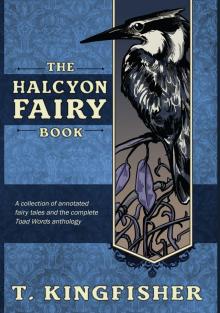 The Halcyon Fairy Book
The Halcyon Fairy Book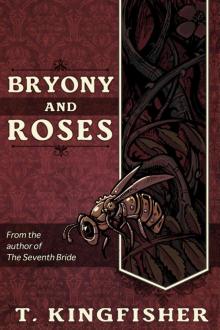 Bryony and Roses
Bryony and Roses The Wonder Engine_Book Two of the Clocktaur War
The Wonder Engine_Book Two of the Clocktaur War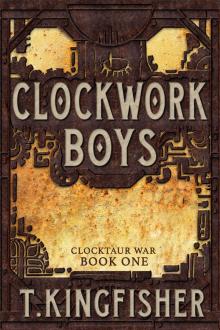 Clockwork Boys: Book One of the Clocktaur War
Clockwork Boys: Book One of the Clocktaur War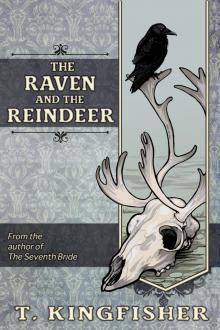 The Raven and the Reindeer
The Raven and the Reindeer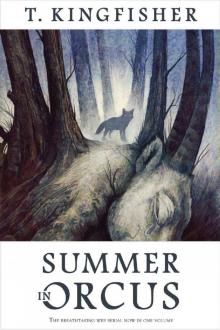 Summer in Orcus
Summer in Orcus The Wonder Engine
The Wonder Engine Seventh Bride
Seventh Bride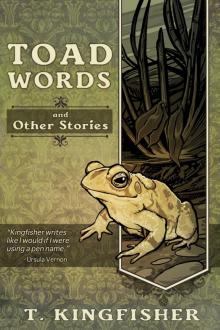 Toad Words
Toad Words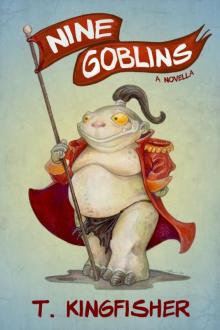 Nine Goblins
Nine Goblins